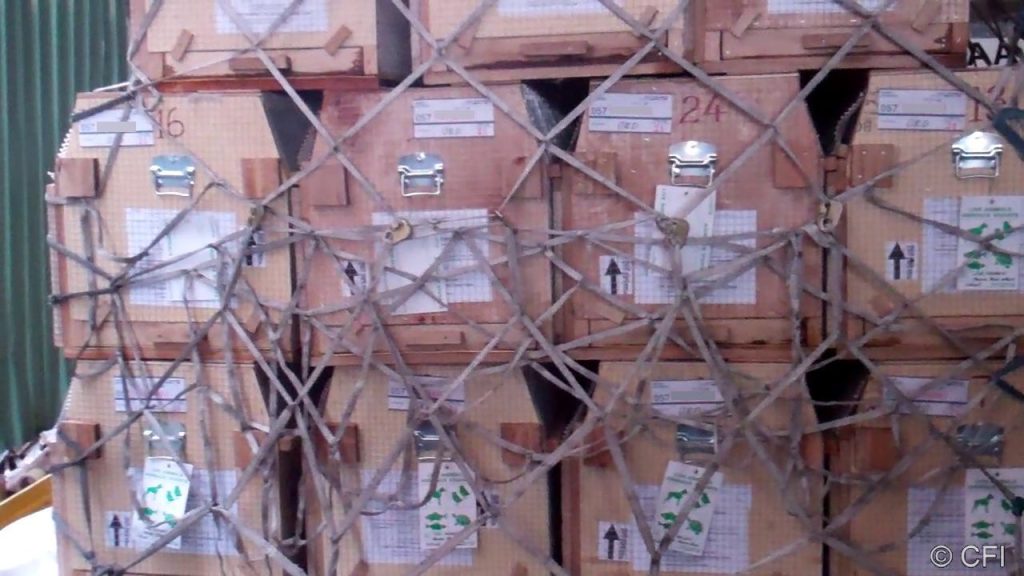Hundreds of monkeys exported from Cambodia as primate protection group appeals to Egyptair to stop transporting monkeys destined for US laboratories
Action for Primates, a UK-based project that campaigns on behalf of non-human primates globally, has appealed to Egyptair to stop transporting non-human primates from Cambodia to be used in research and toxicity testing. It has recently come to light that Egyptair is regularly transporting large numbers of long-tailed macaques (Macaca fascicularis) from Cambodia to laboratories in the USA. The most recent shipment that has come to light, took place on 16th June 2022, with 720 monkeys flown from Cambodia to the USA (JFK) via Cairo, and involved around 26 hours, including almost 7 hours on the ground at Cairo airport. 360 of the monkeys were subjected to a further flight from JFK to Canada, destined for a laboratory near Montreal. Additional hours were spent being loaded/unloaded and transferred to and from airports. Action for Primates was alerted to this flight by an airline staffer concerned about the plight of these monkeys.
The negative welfare issues surrounding the shipping of non-human primates are compelling. Studies carried out by scientists from within the research industry itself have shown that transportation causes profound negative effects on the behaviour and welfare of non-human primates (1,2,3). Monkeys are transported as cargo in crates that are too small to permit normal postural adjustments nor any exercise. They may have to endure inadequate ventilation, noise, extreme temperature fluctuations and delays en route. Statistics for primate deaths and illnesses, either during transportation or subsequently, are generally not publicised. There are, however, reports of monkeys found dead on arrival, including from Cambodia (4). On 15th November 2021, several monkeys were found dead on board a Wamos Air flight from Cambodia to Houston, USA (5).
In addition to welfare concerns surrounding transportation, there are also conservation issues to consider regarding the long-tailed macaque, including a lack of data on wild populations and questions surrounding the validity of captive breeding colonies. The species, the most heavily traded non-human primate species, is protected under Appendix II in the Convention on International Trade in Endangered Species of Wild Fauna and Flora (CITES). Further, a recent global assessment by the International Union for Conservation of Nature’s (IUCN) Red List has increased the status of the long-tailed macaque to ‘Vulnerable’ with a decreasing population trend (6). A lack of population data for the species across its range has raised serious concerns about the conservation status of the species and the impacts of increasing demand on that status.
The transportation by airlines of non-human primates destined for the research and toxicity testing industry is an issue that invokes strong public concern. Many of the world’s leading airlines – including American Airlines, British Airways, United Airlines, South African Airways, Air China, China Airlines, Delta Airlines, Eva Air and Air Canada – ended their involvement in this business. Kenya Airways is the latest airlines to join this list, having stopped transporting monkeys in February this year. Many other passenger airlines and cargo companies have also declared their intent to not become involved in this trade.
Dr Nedim. C. Buyukmihci, veterinary adviser to Action for Primates and an expert on the welfare and well-being of non-human primates, has written to Captain Ahmed Adel, Chairperson and CEO, Egyptair Airlines, urging the airline to join the numerous other airlines that no longer allow the shipping of non-human primates. There has been no response from Egyptair.
ENDS
Action for Primates (AfP) is a UK-based project that campaigns on behalf of non-human primates globally. AfP raises awareness about the plight of and threats to non-human primates around the world and works to end their exploitation, whether in captivity or in the wild. Visit the AfP website: https://actionforprimates.org
For further information: [email protected]

credit Cruelty Free International
References:
1. Fernström, A.L.; Sutian, W.; Royo, F.; Westlund, K.; Nilsson, T.; Carlsson, H.-E.; Paramastri, Y.; Pamungkas, J.; Sajuthi, D.; Schapiro, S.J. and Hau, J. 2008-01-01 “Stress in cynomolgus monkeys (Macaca fascicularis) subjected to long-distance transport and simulated transport housing conditions” Stress 11(6):467-476 https://dx.doi.org/10.1080/1025389080190335
2. Honess, P.E.; Johnson, P.J. and Wolfensohn, S.E. 2004-04-01 “A study of behavioural responses of non-human primates to air transport and re-housing” Laboratory Animals 38(2):119-132 https://dx.doi.org/10.1258/002367704322968795
3. Schapiro, Steven J.; Lambeth, Susan P.; Jacobsen, Kirsten Rosenmaj; Williams, Lawrence E.; Nehete, Bharti N. and Nehete, Pramod N. 2012-03-01 “Physiological and welfare consequences of transport, relocation, and acclimatization of chimpanzees (Pan troglodytes)” Applied Animal Behaviour Science 137(3-4):183-193 https://www.ncbi.nlm.nih.gov/pmc/articles/PMC3388538/
4. Willemyns, Alex and Bopha, Phorn 2014-08-28 “Monkeys sent to US died of trauma en route” The Cambodia Daily https://english.cambodiadaily.com/news/monkeys-sent-to-us-died-of-trauma-en-route-67228/ Accessed 2020-03-15
5. Dalton, Jane and Colley, Claire 2021-11-19 “Monkeys flown to US for lab tests die on board plane” The Independent https://www.independent.co.uk/news/world/americas/monkeys-lab-test-experiment-flight-us-asia-b1960455.html Accessed 2021-12-15
6. Eudey, A.; Kumar, A.; Singh, M. and Boonratana, R. 2020-01-01 “Macaca fascicularis. The IUCN Red List of Threatened Species 2020: e.T12551A17949449” International Union for Conservation of Nature https://dx.doi.org/10.2305/IUCN.UK.2020-2.RLTS.T12551A17949449.en Accessed 2021-12-23
